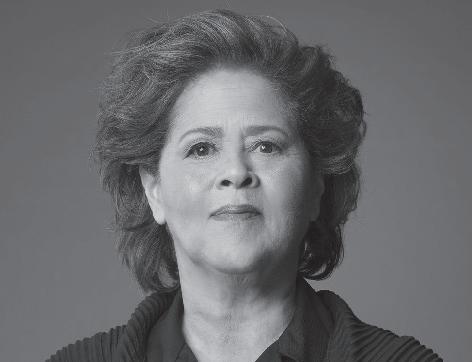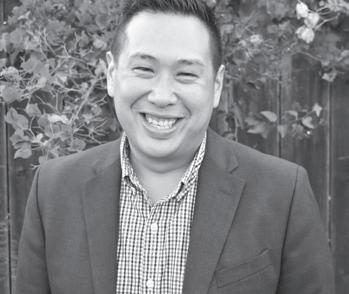
8 minute read
NET GAIN
A conversation between Love All playwright Anna Deavere Smith, director Marc Bruni and Director of Artistic Development Gabriel Greene
GG: How did you both become involved with Love All?
ADS: Growing up, I was the last kid chosen for any activity that involved a ball. The teacher had to force one of the team captains to accept me as a player. Given that fact, I am not the likely candidate to write a play about a tennis champion and the other champions around her: “phenoms,” they are called. Sports writer Sally Jenkins refers to the rare species of which Billie Jean King is a part, as “physical geniuses.” Yet, throughout my career as a dramatist, my focus has been American identity and elements that have caused it to change. When approached to do this project, I said yes because I saw it as an opportunity to revisit and remember a dynamic time in American history and culture – the ‘60s and early ‘70s. There were ceilings, walls and tunnels that I had to come through. Tunnels collapsed, walls crumbled – it was a mess, a glorious one in some ways, but blood was shed too often, at home and abroad. Billie Jean King is an exceptional individual. In the midst of it, she became an agent of positive change.
MB: Harriet Leve, our producing partner on Love All – who brought this project to Anna – and I worked together on Beautiful: The Carole King Musical. I’m apparently the go-to director for any project about a woman who came of age in the ‘60s with the last name of King. In seriousness, I read Anna's first draft and found it deftly dealt with so many intersectional issues – not only women's rights, but also racism, LGBT rights and so many other things that overlap in this period, many of which I got to know very well doing Beautiful. Love All deals with a very similar timeframe, from the late 1950s until the early 1970s.

GG: Which was a particularly turbulent era for all of those intersectional issues.
ADS: The time helped make her, and she helped make the time. Billie Jean King is a living example of how one person can, through a strong vision, cause people to engage in heroic actions, even against the odds. It’s unlikely she could have been as effective as she was if it were not for the disruptions of the 1960s and ‘70s – some of them violent. As Gloria Steinem said to me, “It took three murders to get Richard Nixon as president: two Kennedys and a Martin Luther King.” The play focuses on Billie Jean King, of course, but it also brings to life the others who helped make the seemingly impossible, possible. It also brings to life the people who presented the odds. She changed tennis, women’s sports, men’s sports, youth sports, all sports, forever.

MB: At that point there was such a wild differential in terms of the purses for women tennis players versus male players. And in light of that disparity, Billie Jean and eight other women became the “original nine,” and essentially boycotted the Pacific Northwest Tournament and created their own tournament in Houston, which is widely thought to be the beginning of what allowed women's tennis to become a sport where women can earn 50 million dollars a year.
ADS: Through her persistence in the battle for equality on and off the court, Billie Jean became a beacon for what women could become.
MB: Getting to see the germ of that is a really exciting thing. I think a lot of people’s primary experience of Billie Jean King is through the Bobby Riggs “Battle of the Sexes” match. What's fascinating about this play is that Anna chose to focus on the period prior to Bobby Riggs. It's refocusing the narrative on Billie and not making it about a man. And it illuminates aspects of her life against the backdrop of a country struggling to reckon with some of the same issues we continue to face.
GG: How has Billie Jean King’s involvement helped shape the play?
ADS: Both she and her spouse, Ilana Kloss, have been exceptionally generous – even to the point of getting me courtside seats to see Serena’s last matches. They’ve both given notes on the text. I have also been able to speak several times with Billie’s former doubles partner and soul mate, Rosie Casals. Their positive and encouraging energy, their belief in us, is invaluable.
GG: What do you hope audiences will take away from this story?
ADS: Ilana Kloss said it best: “Billie shows up. She shows up!” I hope audiences take home the following: Show up! Never take things personally. Resilience matters.
Billie Jean King Sports Icon and Equality Champion
Named one of the “100 Most Important Americans of the 20th Century” by Life magazine and the first female athlete to receive the Presidential Medal of Freedom, Billie Jean King is the founder of the Billie Jean King Leadership Initiative, the Women’s Tennis Association and the Women’s Sports Foundation, and part of the ownership groups of the Los Angeles Dodgers, Angel City FC and the Los Angeles Sparks.
In her legendary tennis career, King captured 39 Grand Slam singles, doubles and mixed doubles titles, including a record 20 Wimbledon championships. Her historic win over Bobby Riggs in the 1973 Battle of the Sexes, is one of the greatest moments in sports history. In June 2022, she received France’s highest order of merit, the Ordre national de la Légion d'honneur, from President Macron, and was inducted into the United States Olympic & Paralympic Committee Hall of Fame as a special contributor.

In 2020, Fed Cup, the world cup of women’s tennis, was renamed the Billie Jean King Cup, making it the first global team competition to be named after a woman. In 2019, King’s Southern California roots were recognized with the opening of the Billie Jean King Main Library in her hometown of Long Beach, California. In 2006, the home of the US Open was renamed the USTA Billie Jean King National Tennis Center in honor of her accomplishments on and off the court.
In 2018, King received a Lifetime Achievement Award as part of the prestigious BBC Sports Personality of the Year Awards. In 2021, she received the Laureus Lifetime Achievement Award and the Sports Illustrated Muhammad Ali Legacy Award. King serves on the board of the Women’s Sports Foundation, is an adidas Global Ambassador and is the Honorary Lifetime President of the Elton John AIDS Foundation and a past member of the President’s Council on Fitness, Sports and Nutrition. King is a New York Times best selling author and her memoir, ALL IN: An Autobiography, was published by Knopf in 2021 and released in paperback in 2023.
CHRISTOPHER ASHLEY, The Rich Family Artistic Director of La Jolla Playhouse has served as La Jolla Playhouse’s Artistic Director since 2007. During his tenure, he directed the world premieres of Come From Away, Diana: The Musical, Memphis, Escape to Margaritaville, The Squirrels, A Dram of Drummhicit, Restoration and Chasing the Song, as As You Like It, His Girl Friday, Glengarry Glen Ross, A Midsummer Night’s Dream, Freaky Friday and Xanadu. He also spearheaded the Playhouse’s Without Walls (WOW) initiative, the DNA New Work Series and the Resident Theatre program. Mr. Ashley recently directed Come From Away for AppleTV+ Diana: The Musical for Netflix. Other screen credits include Jeffrey and Lucky Stiff, and the American Playhouse production of Blown Sideways Through Life for PBS. Mr. Ashley’s Broadway credits include Come From Away (Tony and Outer Critics Circle Awards), Diana: The Musical, Escape to Margaritaville, Memphis (Tony Award nomination), Xanadu, Leap of Faith (Drama Desk Award nomination), All Shook Up and The Rocky Horror Show (Tony, Drama Desk, Outer Critics Circle Award nominations). He also helmed productions of Come From Away in London (Olivier Award nomination), Toronto, Australia and on national tour. Other national tours include Escape to Margaritaville, Memphis, Xanadu, All Shook Up and Seussical: The Musical. Additional New York stage credits include Blown Sideways Through Life, Jeffrey (Lucille Lortel and Obie Awards), The Most Fabulous Story Ever Told, Valhalla (Lucille Lortel Award nomination), Regrets Only, Wonder of the World, Communicating Doors, Bunny Bunny, The Night Hank Williams Died and Fires in the Mirror (Lucille Lortel Award), among others. Mr. Ashley is the recipient of the Princess Grace Award, the Drama League Director Fellowship and an NEA/TCG Director Fellowship.

DES McANUFF, Director Emeritus served as La Jolla Playhouse’s Artistic Director from 1983 through 1994, and from 2001 through April 2007. Under his leadership, the Playhouse garnered more than 300 awards, including the Tony Award for Outstanding Regional Theatre. His Playhouse to Broadway credits include: SUMMER: The Donna Summer Musical; Doctor Zhivago; Jesus Christ Superstar; Jersey Boys (four Tony Awards); Billy Crystal’s 700 Sundays (Tony Award); How to Succeed in Business Without Really Trying (five Tony nominations); director and co-author with Pete Townshend on The Who’s Tommy (Tony and Olivier Awards for Best Director) and Big River (seven Tony Awards), among others. He also directed the premieres of Aaron Sorkin’s The Farnsworth Invention and Yoshimi Battles the Pink Robots, which he co-wrote. Opera credits: Faust (The Met, ENO). Film credits: Cousin Bette (director), Iron Giant (producer, BAFTA Award) and Quills (executive producer). Recipient of the Drama League’s 2006 Julia Hansen Award, Mr. McAnuff served as Artistic Director at Canada’s Stratford Festival from 2007 through 2012. In 2012, he was awarded Canada’s esteemed Governor General’s National Arts Center Award and the Order of Canada.
DEBBY BUCHHOLZ, Managing Director of La Jolla Playhouse joined the Playhouse in 2002, serving first as General Manager before becoming Managing Director. She is a Vice President of the League of Resident Theaters (LORT) and a member of its Executive Committee. She is a recipient of a San Diego Women Who Mean Business Award from The San Diego Business Journal. Prior to joining La Jolla Playhouse, she served as Counsel to The John F. Kennedy Center for the Performing Arts and the National Symphony Orchestra in Washington, D.C. She was a faculty member of the Smithsonian Institution’s program on Legal Problems of Museum Administration. Prior to The Kennedy Center, she served as a corporate attorney in New York City and Washington, D.C. She is a graduate of UC San Diego and Harvard Law School. Ms. Buchholz and her husband, noted author and White House economic policy advisor Todd Buchholz, live in Solana Beach and are the proud parents of Victoria, Katherine and Alexia.
ERIC KEEN-LOUIE, Executive Producer
(he/him) joined the Playhouse in 2018 as Producing Director, before becoming Executive Producer in 2021. He previously worked at The Old Globe (Associate Producer and Associate Artistic Director) and The Public Theater (Assistant to the Associate Producer and Director of Special Projects). He assisted Broadway producer Margo Lion on Hairspray and Caroline, or Change. He is a graduate of Columbia University where he received his M.F.A. in Theatre Management & Producing as a Dean’s Fellow and New York University where he earned a B.A. in Dramatic Literature. He serves as Secretary on the National Alliance of Musical Theatre’s Board of Directors. He shares his commute to La Jolla with his husband Anthony Keen-Louie, an administrator in student affairs at UC San Diego. He is a proud third-generation Chinese-American.

LA JOLLA PLAYHOUSE is a place where artists and audiences come together to create what’s new and next in the American theatre, from Tony Award-winning productions, to imaginative programs for young audiences, to interactive experiences outside our theatre walls. Founded in 1947 by Gregory Peck, Dorothy McGuire and Mel Ferrer, the Playhouse is currently led by Tony Award winner Christopher Ashley, the Rich Family Artistic Director of La Jolla Playhouse, and Managing Director Debby Buchholz. The Playhouse is internationally renowned for the development of new works, including mounting 110 world premieres, commissioning more than 60 new works, and sending 33 productions to Broadway – among them the hit musical Come From Away – garnering a total of 38 Tony Awards, as well as the 1993 Tony Award for Outstanding Regional Theatre.







